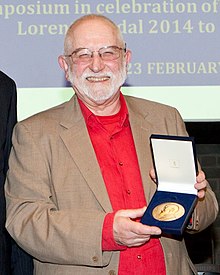Sir Michael Berry | |
|---|---|
 Michael Berry with Lorentz Medal, February 2015 | |
| Born | Michael Victor Berry 14 March 1941 Surrey, England, United Kingdom |
| Alma mater | University of Exeter (BSc) University of St. Andrews (PhD) |
| Known for | Berry phase Berry connection and curvature Berry–Robbins problem Berry–Tabor conjecture Weyl–Berry conjecture Quantum carpet Quantum chaos |
| Awards | Maxwell Medal and Prize (1978) Fellow of the Royal Society (1982) Lilienfeld Prize (1990) Royal Medal (1990) IOP Dirac Medal (1990) Naylor Prize and Lectureship (1992) ICTP Dirac Medal (1996) Knight Bachelor (1996) Wolf Prize (1998) Ig Nobel prize (2000) Onsager Medal (2001) Pólya Prize (2005) Lorentz Medal (2014) |
| Scientific career | |
| Institutions | University of Bristol |
| Thesis | The diffraction of light by ultrasound (1965) |
| Doctoral advisor | Robert Balson Dingle[1] |
| Doctoral students | Jenny Nelson Jonathan Keating |
| Website | michaelberryphysics |
Sir Michael Victor Berry, FRS, FRSE, FRSA, HonFInstP (born 14 March 1941) is a British mathematical physicist at the University of Bristol, England.
He is known for the Berry phase, a phenomenon observed e.g. in quantum mechanics and optics, as well as Berry connection and curvature. He specializes in semiclassical physics (asymptotic physics, quantum chaos), applied to wave phenomena in quantum mechanics and other areas such as optics.
Berry was brought up in a Jewish family and was the son of a London taxi driver and a dressmaker.[2] Berry earned a BSc in physics from the University of Exeter where he met his first wife (a sociology student with whom he had his first child)[3] and a PhD from the University of St. Andrews.[4] His thesis is titled The diffraction of light by ultrasound.[5]
He has spent his whole career at the University of Bristol. He was a research fellow, 1965–67; lecturer, 1967–74; reader, 1974–78; Professor of Physics, 1978–88; and Royal Society Research Professor 1988–2006. Since 2006, he is Melville Wills Professor of Physics (Emeritus) at Bristol University.[6]
((cite book)): CS1 maint: postscript (link)[7]He was elected a Fellow of the Royal Society (FRS) in 1982[9] and knighted in 1996.[10] From 2006 to 2012 he was editor of Proceedings of the Royal Society A.
Berry has been given the following prizes and awards:[11]